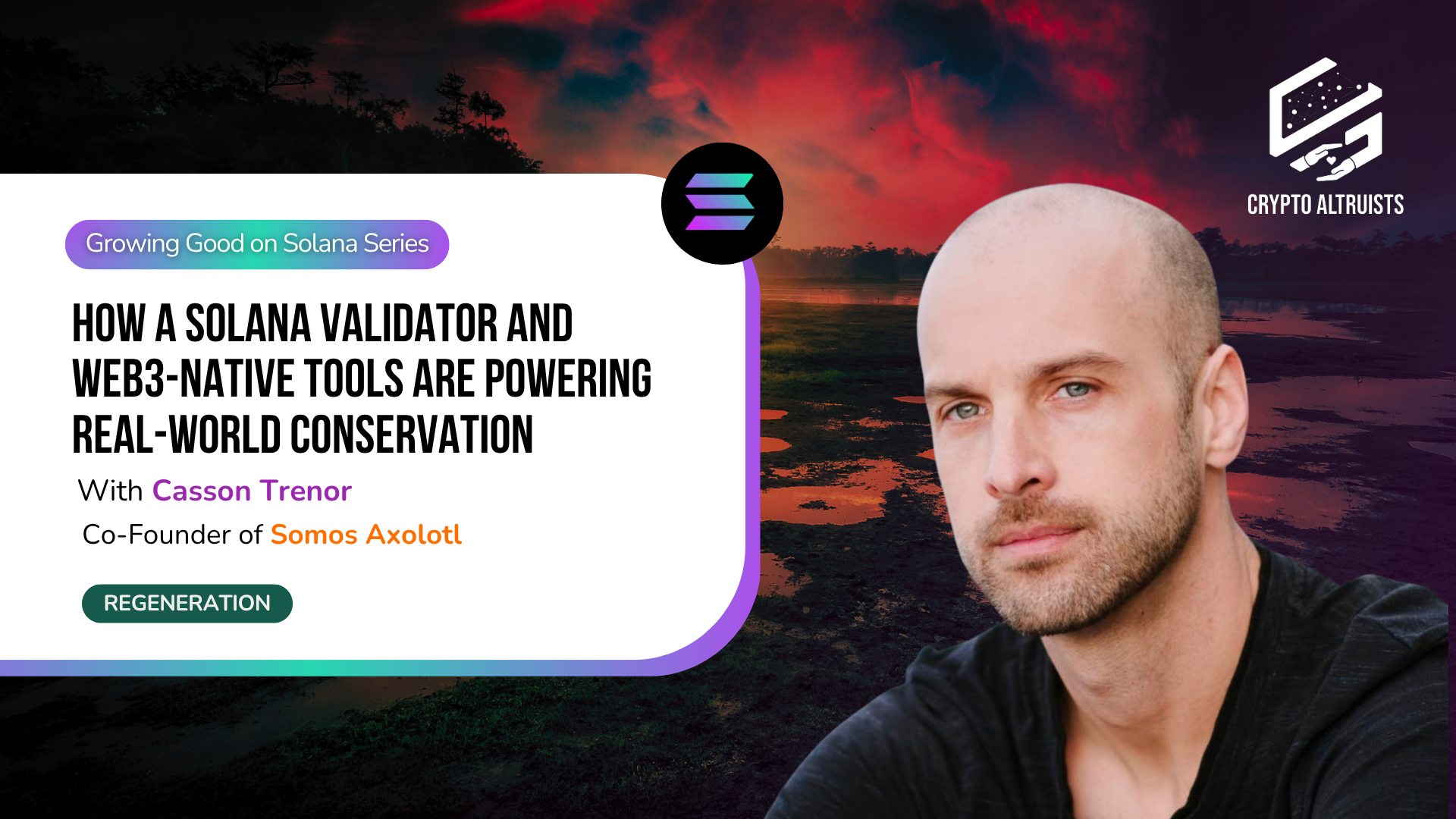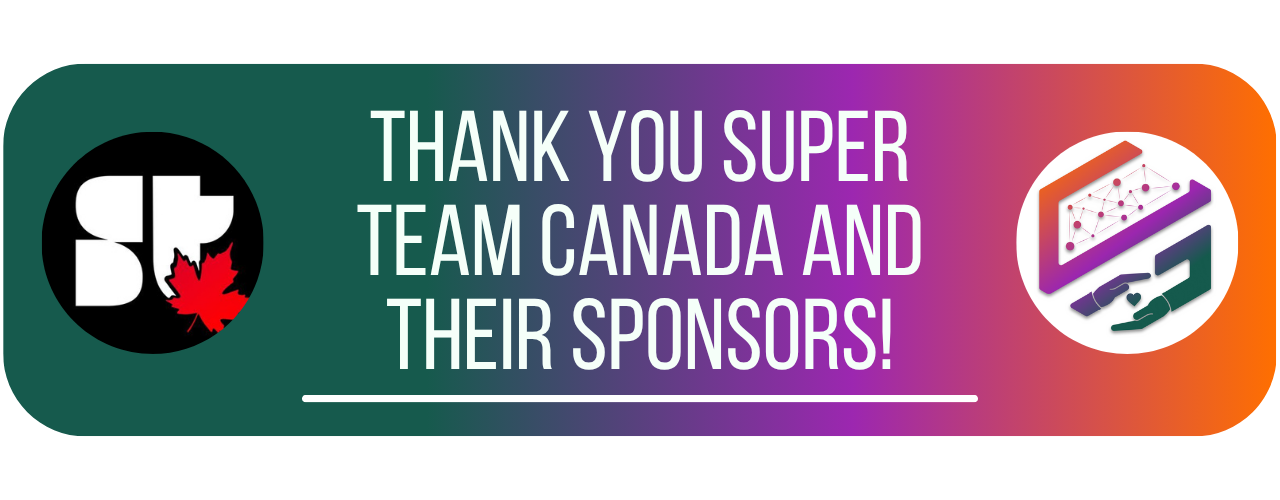
Welcome to the first episode of Growing Good on Solana, a three-part mini-series where we dive head first into the Solana impact ecosystem and highlight some of the incredible builders reimagining what’s possible with Web3.
This series is made possible thanks to support from Superteam Canada and their sponsors. Superteam is helping onboard a new wave of Canadian and global builders into the Solana ecosystem, and we're thrilled to be part of that mission by showcasing the stories of impact-driven founders using Solana to build for good.
To kick things off, we’re thrilled to welcome Casson Trenor, a TIME Magazine “Hero of the Environment” and Co-Founder of Somos Axolotl, a groundbreaking initiative combining blockchain, art, and local partnerships to protect the endangered Axolotl in the wetlands of Xochimilco, Mexico.
Before we dive into the conversation, let’s set the stage with a quick primer on the Solana ecosystem.
Launched in 2020, Solana is a high-performance Layer 1 blockchain designed for speed, scalability, and affordability, making it an increasingly attractive choice for impact-driven builders around the world. What sets Solana apart is its unique consensus mechanism: Proof of History (PoH).
While most blockchains rely on each validator independently agreeing on when events occurred, Proof of History introduces a cryptographic clock that timestamps events before they’re processed by the network. This allows validators to process transactions in parallel rather than waiting for sequential agreement, which improves throughput.
By combining PoH with Proof of Stake, Solana can handle thousands of transactions per second, with finality in seconds and fees that are often fractions of a penny. This performance, along with a growing community and strong support for builders, has made Solana home to some of the most exciting innovations in Web3, including tools for climate action, decentralized science, fundraising, public goods funding, DePIN, and more.
With that in mind, let’s jump into the story of how Casson and the Somos Axolotl team are growing a new model for regenerative philanthropy.
You’ll learn:
🌱 Turning Validators into Conservation Engines: Somos Axolotl flips the traditional validator model on its head, transforming what’s typically a profit-driven protocol role into a mechanism for funding real-world environmental regeneration. It’s a powerful proof that Web3 can make giving a positive-sum game.
🔍 Transparent Giving, Verified Impact: With blockchain rails and on-chain tools, Somos Axolotl is building a future where donors can trace their contributions to measurable outcomes. Imagine a world where every dollar (or SOL) donated links directly to verified, real-time ecological data.
🔥 Solana as a Launchpad for Real-World Impact: Somos Axolotl chose Solana for its high-speed infrastructure, low fees, and vibrant ecosystem, plus the unique opportunity to leverage validator rewards for good. But they also believe in a multi-chain future, where builders choose the right chain for their mission.
Scum Matt Martinez (Co-Founder) - Twitter/X

Please note: we make use of affiliate marketing to provide readers with referrals to high quality and relevant products and services.
03:35 - I’d love to start with your journey! Can you share the journey that took you from environmental activism in the seafood industry to founding a Web3-native conservation initiative like Somos Axolotl?
05:50 - Somos Axolotl is one of the few environmental organizations that was born inside of Web3. Can you give me an intro to the mission of Somos Axolotl, and what inspired you and your co-founders to root this project in blockchain technology from day one, rather than taking a more traditional nonprofit approach?
09:00 - Let’s talk about the heart of your project: Xochimilco. Why is this place so ecologically and culturally important, and what are the main challenges facing the axolotl and the broader wetland ecosystem there?
12:35 - You’ve described Somos Axolotl as an experiment in repurposing blockchain infrastructure for impact. Can you share the story of your Solana validator and how something built for profit and consensus can be flipped into a tool for conservation and public good?
18:45 - The validator model is brilliant because it lets someone support a cause without giving anything up. How do you explain this concept to people used to the traditional donation model, and how do you think this could reshape what philanthropy looks like in the Web3 era?
22:05 - Beyond the validator, what are some other Web3 primitives that you see as valuable in helping nonprofits and activists grow their impact?
26:50 - What drew you to the Solana ecosystem as the home for Somos Axolotl? How has the community, technology, or ethos of Solana supported your mission?
29:55 - In terms of next steps, I understand that you have some new projects in the works, including a LST Game - do you mind sharing a little alpha on this, and the critical role that the validator plays?
37:10 - Do you have a CTA for listeners? Where can they go to learn more and support your mission?
39:45 - How has your experience been forming partnerships with traditional, local organizations as a Web3-native project?
42:20 - What advice would you give to other activists, artists, or builders who want to use Web3 as a force for good, but aren’t sure where to start?
45:35 - And finally, let’s end on a big, hopeful note. What’s your vision for what the future could look like if more people embraced tools like blockchain, regenerative economics, and artful activism to restore balance between people, place, and planet?
Support thoughtful, independent crypto journalism and help us continue highlighting blockchain’s potential for social and environmental impact.
cryptoaltruists.eth
While we may discuss specific web3 projects or cryptocurrencies on this podcast, please do not take any of this as investment advice, and please make sure to do your own research on potential investment opportunities, or any opportunity. We host a variety of guests on this podcast with the sole purpose of highlighting the social impact use cases of this technology. That being said, Crypto Altruism does not endorse any of these projects, and we recognize that, since this is an emerging sector, some may be operating in regulatory grey areas, and as such, we cannot confirm their legality in the jurisdictions in which they operate, especially as it pertains to decentralized finance protocols. So, before getting involved with any project, it’s important that you do your own research and confirm the legality of the project. More available HERE.